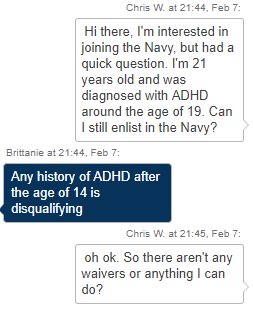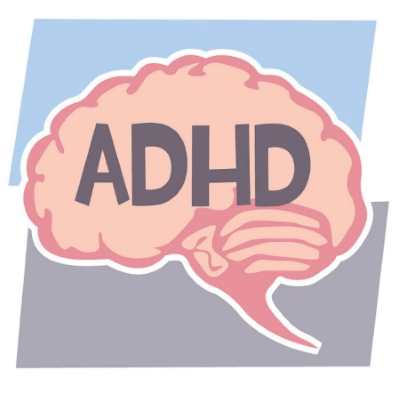If you’ve been thinking about joining the military, but have been diagnosed with ADHD, you may be wondering whether or not you can join.
Short answer: Yes. While there are significant hurdles to jump over, it is possible to join any one of the six branches of the military if you have ADHD.
So how can you join the military if you have ADHD?
1. You need to demonstrate to a military medical examiner that you do not display significant evidence of ADHD symptoms like impulsiveness or distractability.
2. You must be off any and all ADHD medications for a minimum of 2 calendar years. Those medications include Ritalin, Vyvanse, and Adderall.
With that said, some branches of the military have very specific criteria and timelines that need to be met.
Having trouble focusing? Need help with motivation, work, or short and long-term memory?
Check out the ADHD policy for each branch of the military below:
Navy’s ADHD Policy For 2023
I spoke with a Navy recruiter via chat, and she told me that any history of ADHD after the age of 14 is disqualifying.

I asked her if there were any waivers or anything I could do, and she said: “not at this time”.

To confirm this, OMK spoke directly with a Navy recruiter at a recruiting office in Atlanta Georgia.
Here’s what he had to say:
The Navy’s policy is that ADD /ADHD is a disqualifying factor. What needs to happen is the potential recruit would need to go see a specialist. It’s sort of a gray area, and really depends on when the service person was diagnosed.
He referred me to the Navy’s literature on the guidance for various psychiatric disorders, which Navy psychiatrists use to determine if you’re fit for service.
However, since the time OMK spoke with Navy recruiters, the Department of Defense has released a policy for medical disqualifications that applies to all six branches of the military.
In it, it states that ADHD is disqualifying if it occurs with:
- An IEP or other accommodation prescribed after the age of 14
- A history of mental disorders
- Medication prescribed in the last 24 months
- Documented adverse effects on academic or occupational performance
That said, there may be a possibility of a medical waiver. In some services, the medication lapse may be as short as one year.
Army ADHD Policy For 2023

Things were a little bit different when we spoke to an Army recruiter. Sergeant Hewitt, who is a recruiter for the Army stationed in Atlanta, Georgia, said that the Army’s policy is slightly more lenient than other branches of the military.
Here’s what he had to say:
If you are currently taking ADD/ADHD prescriptions, then you are not deployable. If you took prescriptions (like Adderall or Ritalin) in the past, then you must have a waiver from the doctor stating that you no longer show symptoms in the past 7 years.
If the service member thinks they have ADHD, the service member goes to a doctor on base to see if they are ineligible. The bottom line is you cannot deploy if you are taking ADD/ ADHD medication. Anytime you get disability while serving in the Army, the VA compensates you a percentage.
He also referred me to a document that states, in no uncertain terms, that you cannot take any ADD/ADHD or other psychiatric medications while serving in the Army unless a waiver is granted.
Those medications include, but are not limited to:
- Benzodiazepines: Includes medications like Ativan, Xanax, Valium, or Klonopin.
- Class II Stimulants: Includes medications like Ritalin, Concerta, Adderall, Dexedrine, Focalin XR, or Vyvanse.
Check out the full list of prohibited medications here.
Air Force ADHD Policy For 2023

Surprisingly, the Air Force is actually one of the easiest branches of the military to join if you have ADD or ADHD issues.
With that said, this wasn’t always the case (more on that below):
Officially, the Air Forces’ official stance on ADHD goes like this:
Candidates who do not meet the standard of never having taken more than a single daily dosage of medication or not having been prescribed medication for their condition for more than 24 cumulative months after the age of 14 will be processed for a waiver if they have demonstrated at least 15 months of performance stability (academic or vocational) off medication immediately preceding enlistment or enrollment and they continue to meet remaining criteria as outlined in Defense Department Instruction 6130.03.
To put it in simpler terms, if you took medication for ADHD (like Adderall) for 24 cumulative months (not consecutive) after the age of 14, you can get in with a waiver.
In order to get that waiver approved, you need to prove that you can function at a “reasonable cognitive level” without being on any ADHD medications for a period of 15 months immediately before entering the Air Force.
You’re probably thinking, “Well, what exactly is a ‘reasonable cognitive level’?”
This essentially means that you can get good grades and perform mental tasks without screwing up.
Related Article: Which Branch Of The Military Should I Join? 7 Things To Consider
Marines ADHD Policy For 2023

The Marines was actually the most difficult branch to find info on regarding ADD and ADHD.
OMK reached out to a recruiter to get the skinny on what is acceptable, and unfortunately, he didn’t have any firm answers.
Related Article: 41 Questions To Ask A Military Recruiter
What he did say is that the Marines’s policy is that ADHD is disqualifying, but that there are waivers available.
What we do know is that you cannot be on medications for at least a year.
Just like with the other branches, you cannot take any ADHD medications while serving in the Marine Corps.
Coast Guard ADHD Policy For 2023

We spoke with Petty Officer Devoir, a Coast Guard recruiter stationed in Sandy Springs, Georgia.
Here’s what he had to say about ADHD:
The current policy that we have is that you must be off medication for at least 2 years. You must also get a letter from a doctor stating that you no longer suffer from ADHD or related symptoms.
At this time, the Coast Guard does not offer any waivers for ADHD as a condition.
He also noted that you cannot be on any medications like Adderall or Ritalin while serving.
If You Have ADHD, What Can You Do To Enlist?

If you’ve been diagnosed with ADHD, there are several things you need to do in order to enlist in the military.
They include:
1. Consult Your Physician First

First, if you are still on medication, consult your physician and explain your intentions to see if you still should be taking the medicine.
Some people take medication for years they no longer need, and this can hinder your ability to enter the United States military under current policy.
If you are not taking medication, ensure you have been off the medication for a minimum of a year.
2. Get Your Documentation Together

After you have completed those steps, get all documentation together concerning your disorder. That way, if you need a waiver, you have already done your part as an applicant.
3. Review Your Records

After getting all your documentation together, make sure you review your records so you are personally informed about your condition. This way, you will be able to speak intelligently should the situation arise.
4. Visit A Recruiter

After doing this, go to a recruiter and be completely transparent about the situation and they will help you move on from there. If you are not able to enlist at that moment, ask your recruiter what you have to do to move forward in the future and what the Air Force wants to see happen.
Always remember you are in charge of your own career and in turn your own destiny no matter what medical condition you have been diagnosed with or situation you are in.
Do your research and get moving.
5. Do NOT Lie On Your Application

Lastly, DO NOT, I REPEAT, DO NOT lie on your enlistment paperwork about medical conditions. This is a federal crime and can turn into much more of a headache than anyone is willing to deal with. There is not a statute of limitations on fraudulent enlistment especially if you are still serving. Also, lying on your medical documentation prevents medical experts from monitoring your conditions and treating you properly in the future should something happen.
5. Expect Changes in Policy

Recently, much more focus has been put on mental health and cognitive health issues. In the last five years, there has been pressure for the military to be more realistic in their expectations.
In March 2023, the Department of Defense announced that they are testing out whether those with ADHD can serve effectively without the need for a waiver.
It’s possible you may be able to join without a waiver, although they will not have enough data to make a final decision until 2024.
Once you have your medical records in hand, you’ll have a better idea of what to expect when you talk to a recruiter.
The History Of ADHD And The Military

What Was The Military’s Stance On ADHD Issues In The Past?

In the United States Air Force, there is a system in which the organization deals with preexisting conditions in one’s personal, medical, or criminal history. This system is somewhat joked about within the ranks by the term “there is a waiver for that.”
The waiver process in the United States Air Force is quite simple in logic but lengthy and difficult in actual practice.
Essentially, you begin by first identifying what factors about your application package are not automatically accepted by the organization.
After the identification of the factor, the recruiter must then decide whether or not this condition is actually waivable.
After an issue has been determined as waivable, the waiver process begins at the lowest level and goes all the way up to the deciding official that is a subject matter expert on that specific condition.
Medical waivers go to the medical subject matter experts, while criminal deficiencies (like felonies, DUI, etc.) may go to an investigative authority.
Related Article: Can You Join The Military With A DUI?
Alternatively, they can be settled at the commander level of the recruiting office the member is going through.
In previous years, the Armed Forces considered ADHD as an automatically disqualifying factor, meaning it would never make it to the waiver process.
As the Armed Forces began having issues in retaining men and women within its ranks, it began looking at some of the disqualifying factors in hopes to dispel some and in turn open the door for more applicants.
The Armed Forces’ previous stance on not accepting medical conditions such as ADHD can be attributed to issues in military bearing (being able to keep your focus and professional appearance at all times) and risk factors associated with an individual not being able to hold their focus on a specific task.
The Armed Forces were not using the medical condition in a discriminatory manner, but in a manner to maintain good order and discipline in its ranks.
Think about it like this; if someone cannot focus on a given task, why would we task them to work on million-dollar equipment, or protect national secrets or infrastructure?
This logic can be viewed as political, and if brought up to a medical official will probably be scrutinized but for good reason.
Just because a doctor 10 years ago decided an individual cannot focus does not mean they will never be able to be a part of a team to complete tasks and duties. Also, when individuals are diagnosed, there was no system for deciding what level of the medical condition the individual was experiencing.
It was more of a blanket statement that caused the Armed Forces to lose the chance of having some of the world’s smartest and best technicians within its ranks.
What Is The Military’s Stance On ADHD Currently?

After reviewing the policies, the Air Force decided to lift the blockade on enlistees diagnosed with ADHD on a case-by-case basis. The criteria for this range from what jobs does the person qualify for to what medications have they been using.
This allowed many people that were diagnosed as a child to plead their case and actually have it reviewed by a medical officer who will decide whether or not the person is fit for duty.
A Note On Medications

One common misconception about medications in the military is not that you are on a specific medicine. The military is considered a profession of arms, and there are deployments. The main issue is whether or not you can get this medication in a deployed location. And, if you are not able to get your medication, can this affect your overall health in a negative manner?
The Air Force has its member’s best interests at heart when it makes its decisions about medical conditions.
Related Article: Can You Join The Military With That? 20 Potential Medical Disqualifiers
The Air Force and many other branches of the military make changes like the weather. Do not look at their current policy as an end-all, be-all. After all, as described above, they are currently enlisting recruits with a history of ADHD without a waiver.
Do your research and look out for changes in policy for the branch you wish to join. As politics change, the need for personnel in the military change. Standards are becoming more relaxed and the Armed Forces are writing more waivers for those that would like to serve in the ranks.
Hiding Your ADHD From The Military

Another factor to consider on the subject of ADHD is that since it is not a medical condition that can be found by just looking at someone or through an average physical, many people are not aware of whether they have it or not. Some members are aware they have it but do not declare the disorder upon enlistment and are serving in the ranks currently.
This practice is extremely illegal but it allowed some members to enter the Armed Forces without the idea of being shunned due to their past diagnosis. One way to allow members to uphold integrity is to relax the standards and move forward on a case-by-case basis.
Although being caught in a situation where you lied to enter the Armed Forces is considered perjury and is a federal crime, some members were willing to take the chance just to enter an organization that would not have let them in otherwise.
Final Thoughts

Some people may think that if they enter the U.S. military without a diagnosis of a preexisting medical condition, they are automatically given the boot if it is found. This is completely false. The military is a full-running organization with proper medical experts that can diagnose and treat illnesses and disorders.
If you find yourself in the military and you are afraid to bring up a specific medical disorder (that you did not know about before, don’t criminalize yourself), just think about the fact that when you are serving, the Air Force medical team is tasked to keep you healthy.
Related Article: Top 20 Reasons To Join The Military (And 7 Reasons NOT To)
If that means placing a member on a profile or giving them medication, then so be it. In many cases, military doctors will do what they can to keep you healthy and prepared to do your job.
Just because you are on medication or your military doctor finds a disorder does not mean you are no longer fit to serve. It means the same thing as if someone was allowed to serve coming in with preexisting conditions.
A medical expert will review your file and make a determination based on what you do within the military plus a plethora of other factors and use the culmination of information to move forward.
Featured Image: flickr
- Ikon Pass Military Discount: Learn How To Save Big - January 31, 2025
- RTIC Military Discount: Find Out How To Save Big on Gear - January 30, 2025
- Traeger Military Discount: Learn How To Save Big on Smokers - January 28, 2025


